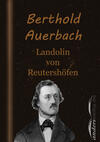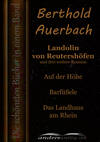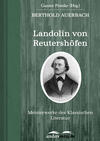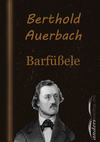Buch lesen: «Villa Eden: The Country-House on the Rhine», Seite 36
Eric was deeply moved. This event could not afflict his young charge so deeply as it did him, for he was conscious of a power mightier than any effort of his own thoughts, drawing him back from the edge of an abyss. He looked into the future, and a fixed resolve was formed within him.
He was summoned away by a messenger from the officer who had conducted the examination, bringing a telegram from Sonnenkamp. It ran thus: —
"Journey to sea-shore given up; coming home; shall find thieves, under whatever title."
BOOK VI
CHAPTER I.
THE MASTER AT HOME AGAIN
Herr Sonnenkamp returned to his villa like a ruler to his castle where a mutiny has lately broken out. Every step in his house, every glance at a servant, said, I am here again, and with me authority and order.
Eric did not lay upon Pranken the blame of what had happened, but confessed that he himself had been guilty of neglect of duty. Sonnenkamp seemed to take pleasure in seeing Eric humbled. He was one of those who love to rule others. With enough humanity in him to make him prefer a willing obedience, he yet had no rest, when that proved impossible, till his man was subdued and brought to his feet; then, and not till then, was he willing to raise him up, for not till then was he sure of the mastery. This self-reliant Captain-doctor had assumed a demeanor that was unbecoming in him; now he was humbled, and would have to be grateful for every act of kindness and friendliness done him. Sonnenkamp had no suspicion of the satisfaction Eric took in his humiliation, or of his motives for it; he regarded this humble submission as a triumph of his authority, while to Eric himself it was a confession of weakness in having been tempted by the magic of Bella's charms to forget the strict watchfulness which was his duty.
Sonnenkamp soon perceived that the amount of the robbery was insignificant. He said, with a certain malicious pleasure: —
"The knaves stole my jewelled dagger; it has a poisoned point, which is death to whomsoever it scratches."
Eric had hardly power left to tell that the dagger was already in possession of the officers of justice, so great a horror thrilled him. Why should this man keep a poisoned dagger?
Pranken and the Major soon appeared, and Pranken was honest enough to take the whole responsibility upon himself. He could not refrain from saying, however, that Eric had previously left the villa to go to a musical festival, and had won a surprising reputation there. Sonnenkamp said, with a smile: —
"You kept Roland at home instead of letting him go to the Baths, in order to keep him free from excitement; have you preserved him from it?"
Eric was prevented from answering by the arrival of the priest, to whom Sonnenkamp, who had never made any gift to the church, announced his intention of presenting to it the gold and silver vessels which had been taken from the sideboard. As if involuntarily, he added: —
"I don't want them any more in my house. You, reverend sir, will give them a fresh consecration."
Eric expressed in a whisper to the Major, who stood by him, his pleasure at this arrangement, and his belief that it would exert a salutary influence on Roland, whose peace of mind had been in a great measure destroyed by the robbery. Sonnenkamp heard his words, though spoken in so low a tone, and said: —
"My highly honored Herr Captain, let me tell you honestly that I have nothing to do with sentimentalities, and that I desire Roland should early acquire a knowledge of these so-called well-disposed lower classes, and learn that they are nothing but a mass of conspiracy against the holders of property, awaiting the first favorable opportunity to break out, or rather to break in."
Sonnenkamp was in the highest degree animated and cheerful. His only cause of regret was, that there should have been so much talk made about the affair in the neighborhood, and that so much valuable time had to be lost in the processes of law. Frau Ceres said not a word about the robbery; it almost seemed as if she had not heard of it. She only rejoiced that Roland had grown so much during her absence. She told Eric that she had met at the Baths a most aristocratic and amiable lady, a relation of his mother, who had spoken of her with great enthusiasm.
The very first evening after the return of Sonnenkamp and his family, a carriage drove up in which were Bella and Clodwig. Eric was delighted to greet his friends, but was somewhat shy of Bella.
"We have come to protect you from this savage," she whispered to him behind her fan; "we will show him that you belong to us. And now you will leave everything and come to us, will you not?"
The words thrilled Eric; he could only bow his thanks.
Bella observed her husband's embarrassment as he stood with Sonnenkamp. His fine and sensitive nature could never overcome a feeling of timidity, of terror, whenever he found himself confronted with this herculean shape. Bella helped him out of the difficulty by saying jestingly, "Herr Sonnenkamp, you must have seen many strange things in your life; did you ever happen to fall in with thieves who openly confessed they had stolen, or were proposing to steal?"
Sonnenkamp looked at her in amazement.
"We are such thieves, in broad daylight," she cried, laughing, and turning to her husband she continued: —
"Now do you speak, dear Clodwig."
Clodwig hesitatingly expressed his wish to have Eric live with him. Sonnenkamp's sharp glance fell upon Bella. The forefinger of his left hand was already raised in playful menace against her, and he was on the point of saying, "I understand you," when he checked himself, and, laying his finger on his lips, said: —
"I am glad to see that our Herr Eric" – with a peculiar emphasis on the word "our" – "that our Herr Eric stands so high in your good graces."
Eric was struck by the peculiar stress laid upon the word "our." He seemed to have become a piece of property. Still more surprised was he at Sonnenkamp's offering him his hand the next moment and saying: —
"You remain ours, do you not?"
Eric bowed.
Bella dwelt, with intentional emphasis, upon the particulars of her visit to Eric's mother in the University-town. She evidently desired to let Herr Sonnenkamp know that a man of Eric's rank and position was not to be crushed on account of a trifling act of neglect. Sonnenkamp whistled to himself inaudibly, as if some plan were ripening in him.
Bella contrived again to be alone with Eric, and expressed to him her satisfaction at the success of her little plot. She knew, she said, that Sonnenkamp would not let him go, but she also knew that he would humble him on account of the neglect he had been guilty of, and therefore persuaded Clodwig to drive over at once. Eric was full of gratitude.
"Did you notice," she asked in a low voice, "what a look Herr Sonnenkamp gave me, and how he raised his finger at me? This man imagines that our friendship is something more than friendship; to the impure nothing is pure. I think you will not misunderstand me, if I sometimes intentionally slight you in the presence of this spying knave."
She gave Eric her hand, and held his long and tightly pressed. Neither suspected that from behind a bush two eyes were fixed upon them, and a sharp ear heard their every word. When they had passed on, Sonnenkamp drew a deep breath as a relief from the long constraint he had put upon himself.
CHAPTER II.
AN INALIENABLE POSSESSION
The next morning came the tidings that the groom whom Sonnenkamp had dismissed shortly before his journey, suspecting him of being a spy of Pranken's, had been arrested in the capital in the very act of offering for sale a large silver goblet. Roland brought the news to Eric, and this was only one of the many interruptions liable at any moment to break in upon the hours of study and thought, in consequence of this robbery. Of what use were lessons when the mind was thus excited? What lasting impression could be made? At one time Eric thought of going hunting more frequently with Roland, in order to amuse him and let him gain fresh elasticity and powers of observation by the pursuit of new objects. But he finally decided on the opposite course, that of helping his pupil not by amusement, but by closer application to his studies. Great was his satisfaction, therefore, at having Roland say to him, —
"Let us forget all else and quietly go on with our work."
The boy's love of study had received an impulse which made every interruption distasteful to him, and led him to look for his best pleasures in his books.
Roland soon became conscious of a fresh energy in Eric, without being able to conjecture its cause; it was the exaltation that follows a danger escaped, escaped by one's own effort. Whenever Eric thought of the days at Wolfsgarten, and his trifling with those feelings which should be the finest of the human heart, he seemed to himself a thief. He had recklessly staked the entire capital which he had so laboriously won; he had allowed himself, under a pretended interchange of noble thoughts, to toy with Bella: to flirt, as he called it in plain language, with Clodwig's wife. To his mind, he had violated a sanctuary; how small, how infinitely small in comparison, seemed the offence of these poor people! He felt deeply humbled in his own eyes. How gladly would he have made a pilgrimage with Roland to some temple where he could purify himself, and where Roland could gain new strength! Whither should he turn?
It is easier for one wearied in the exciting race of life, and burdened in conscience, to enter into the invisible temple built with hands than into the visible temple of science; yet Eric succeeded in doing this. What he would with difficulty have accomplished for himself, perhaps would have failed to accomplish, he did from duty to another. He lost himself in the love of knowledge, and everything became clearer and more intelligible. As an experienced swimmer delights in the onward rush of the waves, dives below the surface to rise again to the light, and with vigorous arms divides the waters; so Eric plunged into science, and felt his heart swell with joy when the mighty waves roared towards him. Gone were all petty fears and anxieties, all self-contest.
In Roland, too, deep currents were stirred. He often went about as in a dream. The ground beneath him, which he now knew to be in constant motion, swam before his eyes: the heavens were no longer there; the old world was dissolved and a new one revealed; while mingling with all this new life within him was the thought that all private property would be abolished, and poverty and riches divided equally among men. Eric observed this excitement in the mind of his pupil. Roland said to him one day timidly, —
"Tell me, Eric, if there will ever come to be no more private property in the world, and consequently no more thieves."
Eric was startled to see how this strange idea had taken hold of the boy. He explained that he had only brought that up as an illustration; the thing itself was an impossibility; he had only meant to show what a radical change might be worked in the minds and lives of men.
Fresh evidences of this unaccountable tendency of the boy's thoughts were constantly appearing. One day he asked Eric to go with him to the huntsman's, to see how his wife and children were faring. He said he had met the man's son, a cooper in the service of the Wine-count, a little while ago, and had offered to shake hands with him, telling him the son was not to blame for what the father had done, even if he had done anything wrong, which he certainly had not; but that the cooper had stared at him, and instead of taking his offered hand, had drawn his hammer from his leather apron, swung it back and forth for a while, and finally walked off.
When Eric and Roland approached the huntsman's house, the birds in the cages were singing, busiest among them the blackbird, with his incessant chirp of thanksgiving, and the dogs were bounding merrily. The wife looked ill and slatternly, and was full of complaints. She told how she had wanted to let all the birds out after her husband was taken to prison, but her son, the cooper, insisted on everything being left as it was till his father came back, which was sure to be very soon; Sevenpiper had in the mean while undertaken to do part of her husband's work, and the cooper attended to the night duties, though he had to work so hard through the day. Everything should be done properly, that the place might be kept open for her husband.
Eric offered her a sum of money, which she refused, saying that her son, the cooper, had forbidden her to accept anything from Sonnenkamp's family.
"If this man is innocent, as I believe he is," said Roland, when they were in the villa again, "what can make up to him for all the anxiety and distress he has had to suffer?"
Eric had no satisfactory answer to give; he could only say that this was another proof of the fact that the best things in life could not be supplied by money.
CHAPTER III.
THE NEW ALLIES, AND A SUMMER FETE
Hardly two weeks had gone by before the lessons were interrupted again. Frau Ceres, who was generally very quiet and took no interest in anything, often referred to a promise she had made to take Roland to see the Cabinetsräthin, (wife of the cabinet-minister), whose acquaintance she had formed at the Baths.
A grand excursion to the capital was decided upon, which Eric alone was not invited to join. The party set out in two carriages. Frau Ceres, Fräulein Perini, and Roland in one, and Sonnenkamp and Pranken in the other.
Pranken began at once to express his satisfaction at the friendly interest Sonnenkamp had shown in the Church; he had on his side already put things in such a train that they could count upon the co-operation of the higher clergy, who were very influential at Court, in carrying out their plan. He felt some compunctions at profiting by his frequent and intimate intercourse with the Prince-cardinal, as a piece of diplomacy; but he was vain enough to wish to pass off upon the world in general and Sonnenkamp in particular, as a stroke of worldly wisdom, the inward illumination which he secretly gloried in. He rejoiced at the relation thus easily established with the Cabinetsräthin, upon whom outside pressure could be brought to bear in a way hardly possible with her husband.
As they drove by a handsome villa, whose shutters were all barred, Pranken suggested that Herr Sonnenkamp should buy it in order to sell it again at a low price to the Cabinetsräthin, who, as he knew, had long cherished a strong desire for such a residence. Sonnenkamp consented, on the condition that it would accomplish his object. It would be one of the levers, Pranken assured him, though not the only one.
Although the two were alone together, neither of them, singularly enough, mentioned their plan by name, till Sonnenkamp said that the Cabinetsräthin had told him a title of nobility was to be conferred on the wine-merchant, and that he wished he might get one first; for he thought he had a better right to the distinction, though he was not going to marry his daughter to a dying man, but rather to the freshest and liveliest of noblemen.
Pranken smiled his thanks, but replied that this priority of the Wine-count, – it could hardly be called precedence – was rather advantageous than otherwise, as it made the conferring of titles appear not so much a matter of private negotiation.
"Your difficulties are greater than those of the Wine-count," he added: "for the Prince-cardinal stayed in his house on his last circuit, so that the Wine-count has on his side the church party, which is as discreet as it is powerful, while you, I would say we, have no party. So much the better; the victory will be all our own."
They reached the capital.
The Cabinetsräthin was delighted, and expressed to Pranken, whom she constantly treated as the head, in fact the president of the party, her great pleasure that a watering-place acquaintance should have ripened into a new friendship.
Pranken insinuatingly remarked that they might become neighbors too.
The country-house was glowingly described, and the fact cautiously yet emphatically stated, that Sonnenkamp had already bought the place for the sake of inducing some noble friends to settle there by letting them have it at a moderate sum.
The lady was delighted; she knew the house very well, it having once belonged to friends of hers whom she had been in the habit of visiting there. She quite envied the people who should live in such a home and have such noble neighbors. She had told her husband, she said, that it was a disgrace to the State that such a man as Herr Sonnenkamp should have no title.
Having thus prepared the way, Pranken disclosed his plan to the Cabinetsräthin, who assured him it could not but be a most desirable thing for society, to have a man of Herr Sonnenkamp's importance admitted to a higher rank. Sonnenkamp assumed an air of great shyness and modesty. A maiden receiving her first offer, which she was quite prepared for, could not have looked more bashfully on the ground; he actually blushed.
They drew their chairs nearer together, as if now for the first time a right friendly and confidential intercourse was established among them. The lady begged that nothing might be said to her husband upon the matter at present; she would manage that part herself; but it would be a good plan to set some other influence at work; if Count Wolfsgarten, for instance, would start the subject at court, it would be easy to play into his hands.
Pranken laid great stress upon the cordial friendship that existed between Clodwig and Sonnenkamp, but urged that a matter of this kind needed to be handled with the greatest delicacy, such as only a lady of the Cabinetsräthin's acknowledged tact was capable of.
Sonnenkamp declared that he did not ask for a title; it must be offered him; his friends must see to that. He rejoiced in the delicacy with which the Cabinetsräthin handled the matter, and he handled it in like manner; his whole demeanor said, This is something quite out of the common course.
He moved his hand quietly, as if he were stroking the back of a very soft cat.
"Are there vineyards attached to this country-house?" suddenly asked the lady.
"To the best of my knowledge," answered Pranken, "there are three acres most favorably situated."
He winked at Sonnenkamp, as much as to say that these must of course be purchased also.
Sonnenkamp at once lost his character of modesty and bashfulness; here was a question of money; here he was master. He wanted to tell the lady that he could not deal in any other than a business-like manner; when he had fairly got his patent of nobility she should take possession of the country-house and vineyards besides; but he was afraid to say it before Pranken, and besides it seemed hardly necessary to come out with it just yet. When it came to the point, he would be man enough not to allow himself to be cheated. There was a triumphant smile upon his face.
The Cabinetsrath entered, saluted Sonnenkamp with formal politeness, and expressed his thanks for the courtesies shown his wife at Vichy.
The party went into the hall, where were Roland and the son of the house, a cadet. Roland's beauty immediately attracted all eyes, and made him the centre of the group. The Cabinetsrath congratulated him on having for a tutor such a finished scholar as Eric, although he was somewhat eccentric in his theories, and as Roland answered some question that were addressed to him by saying he should like to be an officer, advised him to enter the school of cadets as soon as possible.
Pranken said in an aside to the Cabinetsräthin that he entirely approved of Herr Sonnenkamp's plan not to let Roland enter the school till he had received a title, thus sparing him many embarrassments; for if the boy were suddenly admitted to the nobility while in the school, there would be no end to the jokes he would have to endure from his companions.
The Cabinetsrath spoke of the rebuilding of the ruins, of Sonnenkamp's well-known skill in horticulture, and of the complimentary manner in which he had often heard them spoken of in the highest circles.
Sonnenkamp craved permission to send some of his products occasionally to the royal table, especially his beautiful bananas, which were now particularly fine. Pranken thought Herr Sonnenkamp's success in grape culture the most remarkable, for he managed to have fresh grapes upon his table every month in the year.
The Cabinetsrath replied that this courtesy would no doubt be very acceptable, but he had no authority to speak in the matter. The Marshal, who was a cousin of Herr von Pranken, would unquestionably accept the offer.
Pranken at once took Herr Sonnenkamp to see the Marshal, while Roland rode out with the cadet. Frau Ceres remained with the Cabinetsräthin, and apparently caused that lady great surprise by urging her to accept the coral necklace which she wore upon her neck, and which her friend had so much admired.
The lady was obliged to accept it, but begged Frau Ceres to consider it as a token of the intimacy of their private friendship, and not to mention the gift to any one else. She repeatedly declared that she used her interest for her friends without the least motive of selfishness. She laid great stress upon this point, being convinced that Frau Ceres was a party in the plan for gaining her by presents.
Frau Ceres looked at her in amazement, and thought herself again horribly stupid; the woman was speaking of things of which she knew nothing.
The party had not proposed to spend the night in the capital, but on the minister's wife proposing an excursion to some pleasure-grounds, Pranken insisted on their remaining till the next day. It would be a great advantage to have the two open carriages, with Frau Ceres and the Cabinetsräthin in one, and Sonnenkamp, Pranken, and the Cabinetsrath in the other, drive through the streets of the capital to these pleasure-grounds, where the best and most select society would be assembled. The best society should see that Sonnenkamp was already admitted to close intimacy with Count Pranken and the Cabinetsrath.
On the way the Cabinetsräthin was seized with an idea as amiable as it was wise. Both these merits delighted her, and not less her own good-nature. She should win an ally and help a poor woman. With great condescension and pity, she spoke of Eric's mother, who had with a foolish enthusiasm sacrificed her position to a so-called ideal love. Here the Cabinetsräthin looked towards Pranken, between whom and herself so close a league was already established that she did nothing without his approval. A scarcely perceptible nod from him showing her that she might continue, she appealed to Herr Sonnenkamp to do something for Eric's mother; if possible, even to receive her into his house. Aunt Claudine also was spoken of in terms of the highest praise.
The Cabinetsräthin imagined that her relations with the Sonnenkamp household would be much more easily maintained, if the Professor's widow and the aunt formed a part of it; then her intercourse would be in a manner with them, and not with this man. In fact it would be her duty to see as much as possible of these noble women, in order to soften their position of dependence; and that advantage, with many others, would be easily secured when she had established herself in that country-house, which of course had several acres of vineyard attached to it.
Thus there was a mingling of motives, with a good and animating result.
Sonnenkamp smiled blandly, but all the while was saying to himself, – These nobles hold together more closely than a band of thieves; in fact they are thieves, for all this impoverished nobility wants to bolster itself up by me.
He acceded politely to the lady's proposition, with the inward reservation, You have not that estate yet, and the Professor's widow may sit for a while longer at her sewing-machine.
They drove by the country-seat of the Prince, who had lately returned from America. Here everything was in perfect order, and a table, with servants in attendance, was spread in a long, narrow pavilion erected in a grove by the roadside. The sound of military music came from a public garden, and the trees were hung with bright-colored lamps. The officers of the Guard were holding a summer-fête here. Bands of music followed each other in quick succession, one beginning to play the moment the other ceased. The officers were already seated at a table spread under a great tent in the middle of the public garden; while at smaller tables near by sat the dignitaries of the capital, with their wives and daughters, in gay summer dresses.
The two carriages drawn by Sonnenkamp's noble horses' attracted great attention. Pranken quickly gave the necessary directions, and established his party at one of the best tables, towards which many eye-glasses were instantly directed. Pranken, after speaking with his comrades and shaking hands with one and another, soon returned to Sonnenkamp and his party.
The Cabinetsräthin leaned in the most friendly way on Sonnenkamp's arm; Pranken escorted Frau Ceres; Roland and the cadet shot arrows at a target, Roland always hitting the bull's eye.
Sonnenkamp was introduced to the General, and received from him a promise soon to visit Villa Eden. Pranken was glad to be able to show a new recruit in the person of Roland.
As evening came on, the bright-colored lamps were lighted. Suddenly there was a firing of cannon, a beating of drums, and a shouting of huzzas, in honor of the arrival of the Prince from his estate to grace the banquet of the officers. Both bands struck up, "Hail to the Chief," and all was rejoicing. Happiest of the whole company, perhaps, was Sonnenkamp, who had been presented to the Prince and received a few commonplace words from him. Though the words were nothing, the world had seen the Prince speak with him and give him a friendly greeting.
They drove back to the capital in a high state of delight. The colored lamps kept shining and the music sounding.
The next morning it was announced in the papers: —
"Yesterday evening the cuirassiers of the guard celebrated their annual festival on Rudolph's Hill. His Highness, Prince Leonhard, graced the entertainment with his presence. Among the guests was Herr Sonnenkamp, of Villa Eden, with his highly-respected family."




















